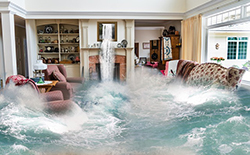 You rely on your homeowners’ insurance in the event of a theft, vandalism or damage. It might not cover your home and possessions during a natural disaster, though. Learn more about natural disasters and why you need extra coverage.
You rely on your homeowners’ insurance in the event of a theft, vandalism or damage. It might not cover your home and possessions during a natural disaster, though. Learn more about natural disasters and why you need extra coverage.
What is a Natural Disaster?
Several types of weather events are considered natural disasters. They include floods, hurricanes, tornados and earthquakes.
Does Homeowners’ Insurance Cover Natural Disasters?
Your standard homeowners’ insurance policy may cover natural disasters. This is especially true if you live in an area prone to a severe weather event. However, most standard homeowners’ insurance policies do not cover natural disasters.
Read your policy carefully to discover what coverage you have. In certain cases, your policy may cover flooding caused by a severe rain storm, for example, but not from tidal surges. You may also talk to your insurance agent for details.
Why You Need Extra Coverage for Natural Disasters
Natural disaster insurance supplements your homeowners’ insurance policy. It goes into effect if a natural disaster strikes. Not only does it give you peace of mind, but it can save you thousands of dollars.
How to Purchase Natural Disaster Coverage
Before you buy supplemental disaster coverage, check the policy and answer these four questions.
-
- Are you eligible?
A natural disaster insurance policy may only be available to at-risk home owners who live in areas that are affected by natural disasters. For example, you might only be eligible for flood insurance if you live in a flood plain. Contact your state’s insurance commissioner, the Federal Emergency Management Administration (FEMA) or the National Flood Insurance Program (NFIP) for information on the most common natural disasters in your area. That information helps you determine if you’re eligible for natural disaster coverage.
- Are you eligible?
-
- Is the timing right?
The best time to buy natural disaster insurance is before a disaster strikes. Most policies have a waiting period, and they will not cover any damages, repairs or replacements if a disaster happens within that time frame.
- Is the timing right?
-
- Does the premium fit your budget?
The cost of a natural disaster policy varies based on your home, where you live and the disaster against which you insure your home. That policy could save you thousands of dollars if a natural disaster strikes, though. Evaluate your budget and your needs then compare several different policies to find the right one for your budget.
- Does the premium fit your budget?
-
- Is the company reputable?
When choosing extra coverage for natural disasters, evaluate the insurance company. A.M Best is one website that gives insurance companies a rating. A higher rating signals greater financial stability.
- Is the company reputable?
When you understand natural disasters and why you need extra coverage, you’re ready to start shopping. Contact your insurance agent to buy the policy that’s right for you.















